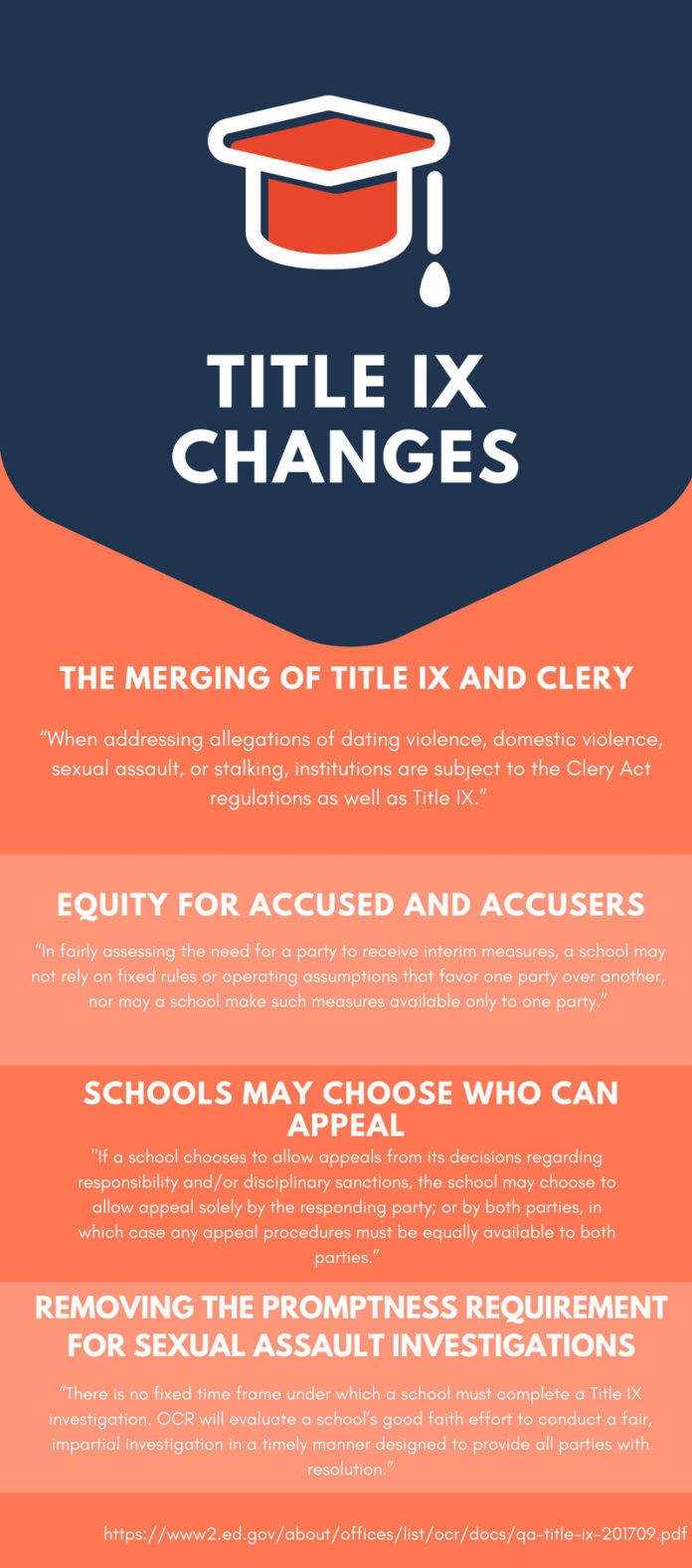By Phoebe Suy | Staff Writer
Led by Secretary of Education Betsy DeVos, the U.S. Department of Education released new interim guidelines for university Title IX compliance. The announcement on Friday ended Obama-era policies that the Department said lacked due process and fundamental fairness.
Some significant changes from the new guidelines include that schools and colleges have the option to apply a higher burden of proof in sexual misconduct cases, can seek informal resolutions and no longer need to operate under a fixed investigation time frame.
Following the Department’s announcement, Baylor said it would maintain its commitment to providing a safe and secure educational environment in the campus community.
“Baylor has made significant investments in creating and implementing policies and procedures to improve awareness, prevention and response to sexual violence within our campus community,” the university said in a statement. “Guided by our Christian values and convictions, we believe that the Title IX process must remain fair and equitable to all students involved. We will continue to apply our policies and procedures as they are currently designed in accordance with best practices, while we monitor the conversations happening within the Department of Education.”
In Q&A format, the guidelines offer temporary guidance for schools and universities while the Department undertakes a formal rulemaking review. DeVos said the department will be seeking comments from stakeholders and the public in addition to feedback from survivors, campus administrators, experts on sexual misconduct and families. The Department said the Obama administration ignored notice and comment requirements.
“This interim guidance will help schools as they work to combat sexual misconduct and will treat all students fairly,” DeVos said in a statement. “Schools must continue to confront these horrific crimes and behaviors head-on. There will be no more sweeping them under the rug. But the process also must be fair and impartial, giving everyone more confidence in its outcomes.”
According to Baylor’s “Sexual and Gender-Based Harassment and Interpersonal Violence Policy,” the university will continue to use a preponderance of the evidence standard, meaning investigations must prove it is “more likely than not the policy violation occurred.”
The 2011 Dear Colleague Letter, a best practice recommendation from the Obama administration, stated that informal resolutions such as mediation were not appropriate means of resolving sexual assault complaints, even on a voluntary basis. However, the interim guidelines now allow informal resolutions such as mediation, given all parties voluntarily agree and the schools determine it is appropriate.
Baylor currently uses two processes to resolve reports of prohibited conduct: Disciplinary Resolution and Alternative Resolution. The formal process of Disciplinary Resolution involves an investigation, adjudication and sanctions when appropriate. Alternative Resolutions utilize “informal or restorative options” that do not involve disciplinary action. Either proceeding may be conducted before, after or simultaneously with off campus civil or criminal proceedings.
The university Title IX coordinator, Kristan Tucker, determines the appropriate resolution in light of reported information, the complainant’s interests and campus safety. Baylor policy states mediation, even if voluntary, may not be used in cases involving sexual assault.
Baylor’s Title IX office will continue to seek the completion of the investigation and resolution process within the 60 calendar day time frame set in the 2011 Dear Colleague Letter. The 60 days begin once an investigation begins.
The interim guidelines redefine a prompt investigation from a standard 60 days to a school’s “good faith effort to conduct a fair, impartial investigation in a timely manner designed to provide all parties with resolution.”
Fort Worth senior Caroline Grace and president of the Baylor chapter of It’s On Us Student Advisory Council said she believes the Department of Education’s rhetoric reminds her of the old Baylor.
“It’s what we’ve heard before, things like “good faith” and “trust the administration” are part of the problem that [Baylor] got into,” Grace said.
While Grace acknowledged the 60 day time frame allotted to the process was not always strictly enforced, she said it gave schools and universities a certain amount of due pressure.
“It puts pressure on universities to get these things done within a semester…so that it doesn’t expand over someone’s entire college career and define an entire college career,” Grace said.
Grace said she believes DeVos’ interim regulations revert the progress made. She said she worries schools will get lost in the process.
“What Betsy DeVos is doing is politics, and what Baylor is going to do is protect them,” Grace said. “If people are worried about Baylor not protecting them, they don’t have to worry about us not fighting back. The organization “It’s On Us” and the Student Advisory Council, we are here to be critical of how Baylor addresses things and to make it better and better and better until we don’t need Title IX anymore.”






